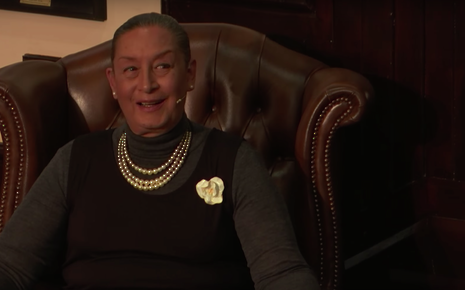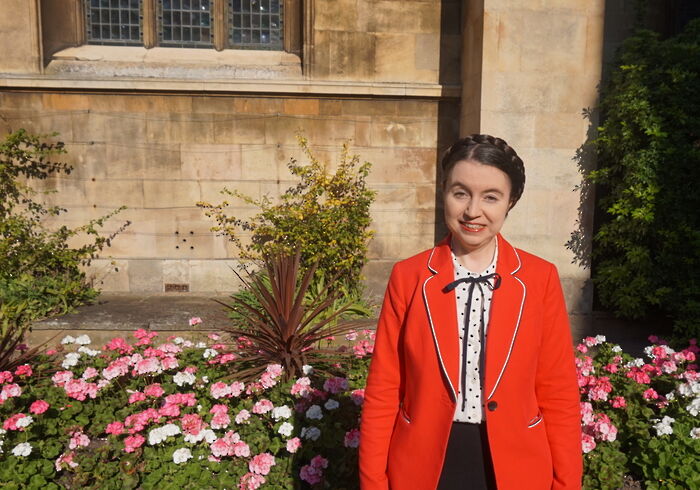Georgina Beyer reflects on her lifetime of work for trans rights
Eoin McSweeney speaks with the world’s first openly transsexual Member of Parliament about the advice she would give to young trans people

Content note: reference to transphobia and sexual assault
“Don’t insult me by telling the likes of me that I can’t be anything I want to be – I’m transsexual.”
When I met Georgina Beyer I was immediately awed by the presence she commanded in the room, as we spoke in the library of the Cambridge Union prior to her talk there earlier this week.
A hint of a smile played across her face as I introduced myself and throughout her talk, and as she surveyed me with a scrutinising eye – it was clear that she is an unstoppable force. It only took a minute of conversation to realise that I was sitting in front of a fearless woman who has never conceded to the pressure of anyone else’s expectations.
“I have a great amount of fear for the 1.4 million transgender population in the US, simply because of the current president and the administration. To suggest that we don’t exist is ridiculous, and I would question the medical science that is siding on this one with Trump; to them I say, fuck you.”
Beyer, a New Zealander, underwent sex reassignment surgery in 1984, and after working in the entertainment industry, found herself employed as a sex worker for a time. While working in the industry, she was abused sexually and physically. She admitted that she was struggling with the cards that she was dealt with before she became the world’s first openly transsexual mayor.
“Seek positive support through existing organisations that are out there now. Talk to a doctor that you trust, and who you respect”
She asked me whether I had ever attended a town council meeting as a member of the public and suddenly found myself as its secretary. When I replied in the negative, she laughed heartily, saying that politics must work differently in her home country. “I had no ambition before that [meeting], I was just trying to get through life as a trans person and drag myself out of the sex industry.”
She initially ran for her local council and lost out by just 14 votes, which she thought was a magnificent achievement (I’d have to agree). Refusing to give up, she soon became mayor of Carteton, a town near Wellington. Then, in 1999, Beyer became the world’s first openly transsexual Member of Parliament. Her first speech to Parliament is now famous.
She said: “This is an historic moment. We need to acknowledge that this country of ours leads the way in so many aspects. We have led the way for women getting the vote. We have led the way in the past, and I hope we will do so again in the future in social policy and certainly in human rights.”
Beyer has stayed true to her word and continued to fight for human rights in New Zealand and internationally. She told me that she’s proud to be from New Zealand, because “while the country is not perfect, it has often led the way on social issues, especially rights for LGBT+ people.” New Zealand banned discrimination regarding sexual orientation and gender identity in 1993, the same year that gays, lesbians and bisexuals were allowed to serve in the military. Same-sex marriage has been legal there since 2013 and in the 1990s New Zealand was considered a world leader for sex reassignment surgeries because of their comparatively low cost and the relaxed public attitude towards them.
We spoke about how the climate surrounding trans recognition and acceptance has evolved during Beyer’s life. She is critical of some of the younger members of the LGBT community today for not being open enough to opposing views. When I explained to her that Jordan Peterson, a man whose views on the use of proper pronouns is controversial – given he has refused to use gender-neutral pronouns, would be speaking at the Union later in the week, a short bout of laughter emanated from her.
Instead of criticising someone like Peterson, she instead said that the people complaining about his opinions face less hostility than what was commonplace in the anti-queer climate she lived in decades ago when she faced heavy abuse and discrimination. “The kind of language that I grew up with was different, and so transsexuals, transvestites, drag queens now seem offensive to young people."
“Don’t take things so personally: it’s quite alright to expect people to address you in the way that you prefer to be addressed, and that’s fine. But stop earbashing people and wagging your finger, and thinking that everyone is against you because they’re not using the correct pronoun.”
She stresses the importance in educating people to advance the acceptance of the trans community, and asserts that young trans people mustn’t forget the role which older activists had in pushing for positive change.
“If it hadn’t been for people like me and my contemporaries at the time, who went through the real hard struggle, there would be a lot more disrespect there”
“They [young trans people] need us to be there behind them, mentoring them and being the elders whose shoulders they stand on, frankly.
“We gave them the voice that they have today, and have enabled them to do what they do and say what it is they say. If it hadn’t been for people like me and my contemporaries at the time, who went through the real hard struggle, and I mean the real hard struggle, there would be a lot more disrespect there.”
That being said, Beyer readily acknowledges that trans people still face economic and social restrictions across the world, and is deeply sympathetic to adolescents who are suffering. The suicide rate within the transgender community is also disproportionately high, particularly among adolescents.
A 2018 study published by the American Academy of Pediatrics showed that 50.8% of female to male transgender adolescents had previously attempted suicide – compared to 17.6% in cisgender female and 9.8% in cisgender male adolescents. This can be a heartbreaking consequence of experiences such as family rejection, bullying and harassment.
Beyer had advice to give to struggling young trans people. “Seek positive support through existing organisations that are out there now. Talk to a doctor that you trust, and who you respect. Support your parents, because they will be concerned quite possibly that they have done something wrong, when they have done nothing wrong. There will be hard times, and you will doubt yourself, but don’t do anything in a hurry necessarily.” She was keen to point out the evils of conversion therapy, saying that it’s “bloody ridiculous.”
As we finished our discussion, we joked about that first speech in Parliament and how she had to break the ice early on to gain the respect of her peers. Even though she is an inspiration and icon to many, her ability to laugh at herself was striking. She explained that it was important to never take yourself too seriously. That was just one of the valuable gems of information I gleaned from Beyer, an inspiring and resilient woman.
 Features / Should I stay or should I go? Cambridge students and alumni reflect on how their memories stay with them15 December 2025
Features / Should I stay or should I go? Cambridge students and alumni reflect on how their memories stay with them15 December 2025 News / Cambridge study finds students learn better with notes than AI13 December 2025
News / Cambridge study finds students learn better with notes than AI13 December 2025 News / Dons warn PM about Vet School closure16 December 2025
News / Dons warn PM about Vet School closure16 December 2025 News / News In Brief: Michaelmas marriages, monogamous mammals, and messaging manipulation15 December 2025
News / News In Brief: Michaelmas marriages, monogamous mammals, and messaging manipulation15 December 2025 Comment / The magic of an eight-week term15 December 2025
Comment / The magic of an eight-week term15 December 2025









